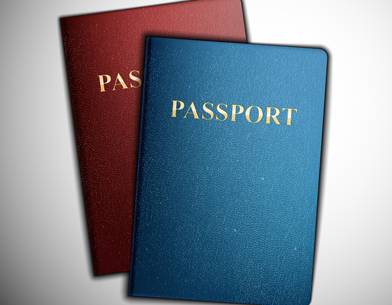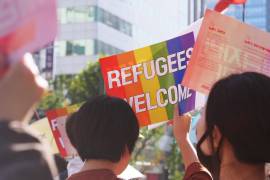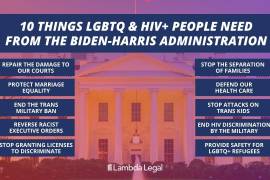
Helping LGBT Immigrants Integrate
Blog Search
Guest blogger Luis Román is a Uniting America Fellow at Lambda Legal’s Midwest Regional Office in Chicago.
This year has been particularly remarkable for the LGBT movement. As this holiday season brings this year of many triumphs to an end, we must also acknowledge our unfinished progress.
While we rejoice about marriage equality in 18 states and the District of Columbia, and celebrate at the demise of the Defense of Marriage Act (DOMA), we cannot forget Congress’ inaction on two important goals for the LGBT community: a federal workplace nondiscrimination law (ENDA), and LGBT-inclusive immigration reform.
For Lambda Legal, supporting immigration reform is about fighting for a specific segment of our community – LGBT immigrants and immigrants with HIV, who continue to encounter extraordinary obstacles not only in achieving equality, but in simply feeling safe.
There are close to 1 million LGBT adult immigrants living in the United States. LGBT immigrants, documented and undocumented, encounter very specific challenges as they make their home in the U.S. and integrate into their communities. Some LGBT immigrants are never completely out, never feel welcome or safe, due to anti-immigrant attitudes, combined with homophobia and transphobia.
At Lambda Legal, we posed ourselves this question: What does LGBT immigrant integration look like? Immigrant integration is more than just immigration reform; it includes, among other issues, civic engagement, acculturation, education, equal access to community resources, and citizenship.
To explore this question further, Lambda Legal participated in the National Immigrant Integration Conference (NIIC) last month in Miami. NIIC brought together an array of advocates, elected officials, service providers and other community leaders.
Historically, during the migration waves of the 20th century, immigrant integration was taken up by different sectors: government, nonprofits and even private business. Together, these sectors worked to ensure that immigrants were able to fully participate in all of mainstream society’s institutions and functions, and become productive members of society. Today, this work has fallen off the national agenda and is mostly carried out by under-resourced local organizations, churches, and on the rare occasion, by local government. For example, funding to teach immigrants English has decreased significantly, even though demand has increased.
At NIIC, we were pleased when many immigrant rights advocates participated in the various workshops and discussions we helped host about LGBT immigrants and their integration into American communities. The challenges are daunting; usually there are no LGBT-specific resources in immigrant communities, and local community-based organizations may not have the knowledge, or even a useful referral to help with concerns like coming out, discrimination, or immigration issues for binational same-sex couples. Similarly, LGBT organizations usually do not have many resources available in languages other than English, or may not have experience working with LGBT immigrants whose cultural norms may differ from LGBT immigrants with diverse cultural norms. In many cases, LGBT organizations are invisible to immigrants. For immigrants (and their families) who are struggling with their sexual orientation and/or gender identity, and for those who fled their countries seeking a safer environment, this situation not only hinders their integration – it can also be dangerous.
To address these issues, Lambda Legal has throughout the year been actively supporting events targeting the immigrant community. Earlier this year, Lambda Legal co-sponsored the Flag Day Festival in Chicago. After a huge public naturalization ceremony, Lambda Legal was there to congratulate these new American citizens.
This type of outreach is important, not only because it sends a message that LGBT organizations care about immigrants, but also because we are able to engage in conversation with these new Americans about LGBT equality. We begin to break down any preconceived notions they may have about LGBT people, especially for those who come from countries where sexuality is not openly discussed or where there isn’t a very active LGBT movement. Most importantly, Lambda Legal is there because we want to assure LGBT immigrants and their families that they are important, that they are a part of our community, and that we will fight to protect them and their rights.
We don’t have to wait for Congress to act on immigration reform – we can start in our communities. Engage with your immigrant neighbors, share about your family and learn about theirs. We know that the battle for LGBT equality and for immigration reform is about the same thing – justice for our families. Our love for our families transcends sexual orientation and immigration status. It is what unites us as a community.




